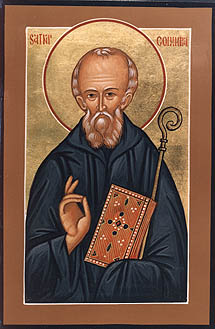
When sufficiently advanced in letters he entered the monastic school of Moville under St. Finnian who had studied at St. Ninian's "Magnum Monasterium" on the shores of Galloway. Columba at Moville monastic life and received the diaconate. In the same place his sanctity first manifested itself by miracles. By his prayers, tradition says, he converted water into wine for the Holy Sacrifice (Adam., II, i). Having completed his training at Moville, he travelled southwards into Leinster, where he became a pupil of an aged bard named Gemman.
On leaving him, Columba entered the monastery of Clonard, governed at that time by Finnian, a remarkable, like his namesake of Moville, for sanctity and learning. Here he imbibed the traditions of the Welsh Church, for Finnian had been trained in the schools of St. David. Here also he became one those twelve Clonard disciples known in subsequent history as the Twelve Apostles of Ireland. About this same time he was promoted to the priesthood by Bishop Etchen of Clonfad. The story that St. Finnian wished Columba to be consecrated bishop, but through a mistake only priest's orders were conferred, is regarded by competent authorities as the invention of a later age (Reeves, Adam., 226).
Columba is said never to have spent an hour without study, prayer, or similar occupations. When at home he was frequently engaged in transcribing. On the eve of his death he was engaged in the work of transcription. It is stated that he wrote 300 books with his own hand, two of which, "The Book of Durrow" and the psalter called "The Cathach", have been preserved to the present time. The psalter enclosed in a shrine, was originally carried into battle by the O'Donnells as a pledge of victory. Several of his compositions in Latin and Irish have come down to us, the best known being the poem "Altus Prosator", published in the "Liber Hymnorum", and also in another form by the late Marquess of Bute. There is not sufficient evidence to prove that the rule attributed to him was really his work.
In the spring of 597 he knew that his end was approaching. On Saturday, 8 June, he ascended the hill overlooking his monastery and blessed for the last time the home so dear to him. That afternoon he was present at Vespers, and later, when the bell summoned the community to the midnight service, he forestalled the others and entered the church without assistance. But he sank before the altar, and in that place breathed forth his soul to God, surrounded by his disciples. This happened a little after midnight between the 8th and 9th of June, 597. He was in the seventy-seventh year of his age. The monks buried him within the monastic enclosure. After the lapse of a century or more his bones were disinterred and placed within a suitable shrine. But as Northmen and Danes more than once invaded the island, the relics of St. Columba were carried for purposes of safety into Ireland and deposited in the church of Downpatrick.
Since the twelfth century history is silent regarding them. His books and garments were held in veneration at Iona, they were exposed and carried in procession, and were the means of working miracles (Adam., II, xlv). His feast is kept in Scotland and Ireland on the 9th of June. In the Scottish Province of st Andrews and Edinburgh there is a Mass and Office proper to the festival, which ranks as a double of the second class with an octave. He is patron of two Scottish dioceses Argyle and the Isles and Dunkeld. According to tradition St. Columba was tall and of dignified mien. Adamnan says: "He was angelic in appearance, graceful in speech, holy in work" (Praef., II). His voice was strong, sweet, and sonorous capable at times of being heard at a great distance. He inherited the ardent temperament and strong passions of his race. It has been sometimes said that he was of an angry and vindictive spirit not only because of his supposed part in the battle of Cooldrevny but also because of irritant related by Adamnan (II, xxiii sq.) But the deeds that roused his indignation were wrongs done to others, and the retribution that overtook the perpetrators was rather predicted than actually invoked.
Whatever faults were inherent in his nature he overcame and he stands before the world conspicuous for humility and charity not only towards has brethren, but towards strangers also. He was generous and warm-hearted, tender and kind even to dumb creatures. He was ever ready to sympathize with the joys and sorrows of others. His fasts and vigils were carried to a great extent. The stone pillow on which he slept is said to be still preserved in Iona. His chastity of body and purity of mind are extolled by all his biographers. Notwithstanding his wonderful austerities, Adamnan assures us he was beloved by all, "for a holy joyousness that ever beamed from his countenance revealed the gladness with which the Holy Spirit filled his soul". (Praef., II.)




